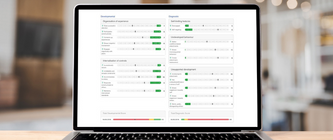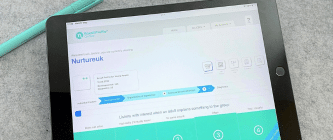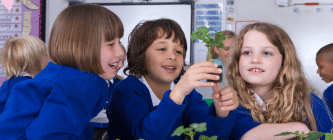Boxall Profile®
Boxall Profile® Online Autumn 2023 Update
The Boxall Profile® Online is an invaluable online teaching resource for the assessment of children and young people’s social, emotional and behavioural development.
At nurtureuk we continue on our mission to improve the Boxall Profile® Online, to make it an even more powerful assessment tool for schools and educational settings to assess, plan, track and help improve the social, emotional, mental health and wellbeing of their children and young people.
After listening to user feedback we have been working hard over the summer months to update the Boxall Profile® Online and we’re excited to share these updates with you.
What’s new?
Introduction to Boxall Profile® Online Course now included with every new and renewed subscription
To help every user get the most out of their Boxall Profile® Online subscription we have added 10 tokens with each subscription to access the Introduction to Boxall Profile® Online Course. Once a subscription is purchased, the organisation will find the code in the Subscriptions & Payments section of their account.
The code can be used by up to 10 users within an organisation (individual access) and usage is tracked in the Subscriptions & Payments section of their account. This is applicable for all new and renewed subscriptions purchased from Wednesday 13th September 2023.
NEW Import Function
We have introduced a way for organisations to import their pupil data through our new Import Function. This will allow organisations to bulk upload their pupil data and allocate to the correct classes. This new function will hopefully save settings and educators valuable time and resources.
NEW Archive Function
We have developed a simple way for you to archive an organisation’s older pupil data so that the data viewed in the Whole School, Classes & Groups is relevant and representative of the current students.
UPDATES to Data Filtering and Summary Overview
We have also updated the date filtering on the Whole School Data and added the additional profile fields to the Summary Overview export to help with data analysis and measurement of progress.
To find out more please read our product update blog series at www.boxallprofile.org.
Here at nurtureuk we are committed to the ongoing development of the Boxall Profile® Online, to support Educational professionals in understanding the underlying needs of children and young people and to improve wellbeing and access to education for all.
Find out more by clicking here.
Helping children and young people return to school
Children and young people are struggling with social, emotional and mental health issues like never before. For some children, the summer holidays will have made these issues worse, and they will be experiencing higher levels of stress and anxiety as they return to school. For others it’s the return to school that is the cause of anxiety. It is vital that all children are sufficiently supported at the start of the new academic year so they are ready and able to learn.
How can you support pupils with their social, emotional and mental health needs?
There are many different reasons why children and young people may be anxious about returning to school. They may be nervous about having different classmates and trying to make friends, or may be struggling with homework or lessons, or even having difficulty building relationships with teachers. For some children, the school environment itself can cause them lots of stress. If this is the case for some pupils, then we recommend setting up nurture groups in your school.
Nurture groups are a targeted intervention for children and young people with social, emotional, behavioural and/or mental health difficulties. They support pupils to form attachments to caring and supportive adults at school. Nurture groups help pupils to feel safe at school which is one of the Six Principles of Nurture, and can lead to improved behaviour which in turn can help to reduce exclusions. Nurture provision can help to remove the barriers to learning and enable children to overcome challenges so they can succeed at school.
The start of school may be especially challenging for children who are entering a transition year from primary to secondary school. The move to secondary school is one of the biggest shifts in a child’s education. Children will experience a change of classes and teachers, an increase in school size and staff numbers, different teaching styles and a wider curriculum.
To ensure a smooth and successful transition to secondary school, we recommend taking a look at The Transition Tool Box resource by Dr Tina Rae, which includes a wide range of strategies and activities for supporting children through this transition process. Teachers and parents can help by planning a child’s transition, making strong connections and establishing new routines.
Making the transition from home to school will be harder for children that have social, emotional and behavioural issues. Schools should monitor the social, emotional and mental health needs of all pupils and address them at an early stage. The Boxall Profile® allows teachers to understand a child’s social and emotional competencies, and to plan effective interventions and support activities where needed.
The Boxall Profile® can generate unique lesson plans tailored to each child’s specific social, emotional and mental health needs which can help educational professionals to support and promote the emotional wellbeing of children and young people. Once the social and developmental targets for each pupil have been met, the pupil can then be reintegrated into their mainstream class.
By using the Boxall Profile® and implementing a nurturing intervention at the start of the new school year, you can get to the heart of a child’s challenges and support them to build connections and resilience. It is a highly effective way of supporting improved behaviour and increased attendance in schools, leading to better attainment and reduced exclusions. With the right support, children can successfully adjust to their new school or class, build new relationships, learn new skills, and thrive.
For more information about the benefits of the Boxall Profile® and to purchase a subscription, please visit our Boxall Profile® website.
The Boxall Childhood Project | A whole-school approach to the Boxall Profile®
The Boxall Profile® is a unique online tool that assesses the social, emotional and mental development of pupils aged 4-18. We recommend that you use the Boxall Profile® to assess pupils across the whole school, as it gives headteachers and senior management teams a more rounded view of the wellbeing of the children and young people in their care.
In 2017, we launched a two-year project called the Boxall Childhood Project which looked at the benefits and challenges that schools encountered when completing Boxall Profiles® for the whole school.
As part of the pilot project, 40 schools in England were recruited and key members of staff were trained to use the Boxall Profile®. These key members of staff delivered training to their colleagues and put in place systems to assess all of their pupils. In total, more than 5,400 children and young people were assessed in Summer 2017 (during the first assessment period).
Findings
The data from these assessments showed that in an average primary school classroom, one in three children may have some social, emotional and behavioural difficulties. It also identified the following:
- 19 children had no apparent needs
- 7 children had some form of social/emotional or behavioural difficulties
- 4 children had high levels of needs in both social/emotional and behavioural difficulties (typically, three boys and one girl)
These figures show just how important it is to use the Boxall Profile® across the whole school as it helps schools to identify children and young people who need additional, more focused support through nurturing interventions, or as part of a nurture group.
Teacher reports also showed that 43% of children with high levels of social, emotional and behavioural difficulties do not access any form of wellbeing or mental health support – either at school or outside. There could be many reasons why these vulnerable children do not receive the support they need, for example schools may not be aware of the scale of difficulty experienced by these children.
The Boxall Childhood Project highlighted just how many children are affected by these social, emotional and behavioural difficulties, whilst also raising awareness of the importance of nurture, attachment and neuroscience, so that teachers can better understand and respond to difficult behaviour and the social, emotional and mental health needs of their pupils.
Our recommendations to schools
We believe the most effective way to support every child with their social, emotional and mental health needs or adverse childhood experiences, and equip teachers with the necessary tools for teaching to meet these needs, is to implement a whole-school nurturing approach.
That includes support for pupils and staff, working across the curriculum and involving pupils, governors and parents. It means provision for developing the wellbeing and resilience of everyone and targeted support for those who have significant difficulties. This can only happen with senior leadership commitment, staff development and a supportive culture.
The National Nurturing Schools Programme is a programme that allows staff to develop personally and professionally while embedding a nurturing culture throughout their schools, enhancing teaching and learning, promoting healthy outcomes for children and young people. This is achieved by focusing on emotional needs and development as well as academic learning in a whole-school environment. This involves embedding the Six Principles of Nurture and using the Boxall Profile® across the whole school.
The National Nurturing Schools Programme equips staff with the tools they need to implement a whole-school approach to supporting the social, emotional, mental health and wellbeing of all pupils and staff, allowing every child to become able to learn.
Beyond the Boxall Profile® for Young People: Whole-Class Strategies
We are delighted to announce the release of a new Boxall Profile® book – Beyond the Boxall Profile® for Young People: Whole-Class Strategies. Authors Adele Wilkinson and Carrie Thorne tell us more about this vital resource.
_________________________________________________
The original version of this book was released in 2019 and has proved to be an invaluable resource for schools who want to use the Boxall Profile® to help groups and classes of children, not just individual pupils. This made us want to create something similar, but with a secondary age focus.
We wanted to provide educators with a ‘dip in, dip out’ resource which would be really practical and useful; something which could provide simple but effective strategies that can be used throughout the school day. Whether they are used in the whole class or in small groups, the strategies aim to help young people build the social and emotional skills they need to succeed, allowing them to engage with their own behaviour and learning, and make the most of secondary school.
We intended for this resource to be used in multiple different ways and contexts; for example, if a teacher was aware that many young people in their class or group were struggling in strand A, they may ask themselves, ‘What can I do to help them? What will enhance my quality first teaching here?’ The book we have created has multiple ideas to help with questions like this. It is straightforward, practical and contains very simple starting points that as practitioners we might want and need.
A couple of our favourite sections include looking at form time and also thinking about the power of play in secondary – sometimes there is little thought given to these areas and yet so much time is spent in form for most secondary pupils! Are we always getting the most out of it? Is form time nurturing in all schools? If not, what can we do about that?
And play, is it considered ‘not very secondary’? Yet research tells us how important this fundamental right is for young people, for skill development and wellbeing. Do we think about this enough?
We know more and more schools are keen to support the social and emotional wellbeing of all the pupils in their care, and to this end assess every young person in their setting using the Boxall Profile®. For teaching staff, form tutors and support staff, using the Boxall Profile® as a classroom resource allows them to establish where social, emotional and behavioural needs lie and can help them to put in place strategies to target and respond appropriately to those needs. This will not only help the young people but will also help staff to implement what would be useful and more effective interventions as part of teaching and learning. Staff will be able to support all students, while ensuring a focus on inclusive practice and removing barriers to learning.
The resources included in the book have been trialled, tested and specifically selected to be used within secondary environments to allow staff to support the wellbeing of every young person, while at the same time fitting within the secondary curriculum. We are also grateful to the staff from our partner schools and settings who were so instrumental in the development of this resource. This was so helpful, and ensures that the book is relevant, realistic and current too.
It is suitable for mainstream and special secondary settings. We hope you like it and would love to hear which bits of the book you have found most useful.
__________________________________________
The Boxall Profile® is a way of understanding what lies behind pupils’ challenging behaviour to detect any unmet social, emotional and mental health needs. Once social and emotional needs are identified, education professionals can put in place targeted support to help children and young people develop those skills, and this in turn will help to improve their behaviour, mental health and wellbeing.
By using the Boxall Profile®, teachers can adopt the following strategies to help improve children and young people’s social, emotional and mental health:
- Giving pupils the opportunity to practise their social and emotional skills – for example by encouraging them to work in pairs and groups.
- Making time for social-emotional learning, either during targeted PSHE lessons or by embedding it throughout the curriculum.
- Modelling good social and emotional skills themselves, when interacting with pupils and other staff members.
The Boxall Profile® allows teachers to develop an inclusive, whole class approach that enables them to access all their pupils, by removing individual barriers to learning.
To get started or for more information about the Boxall Profile®, please take a look at our website.
We have updated the Boxall Profile® Online
The Boxall Profile® Online is an invaluable online teaching resource for the assessment of children and young people’s social, emotional and behavioural development.
After researching and listening to user feedback we have been working hard to update the Boxall Profile® Online and we’re excited to share that the updates are now live.
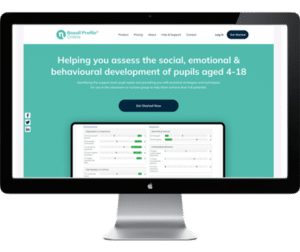
What’s new?
We have improved the layout, added much needed functionality such as the creation of custom groups and new ways to view and display data. Other features include:
- NEW Boxall Profile® Online branding and website
- NEW Layout
- NEW Class/School/Group & Strand View
- NEW Search, Filtering & Custom Groups
- NEW End of Year Migration
- NEW Export Function
- NEW Help & Support
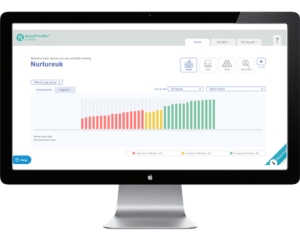
To find out more please read our product update blog at www.boxallprofile.org.
Here at nurtureuk we are committed to the ongoing development of the Boxall Profile® Online, to support Educational professionals in understanding the underlying needs of children and young people and to improve access to education for all.
Find out more on our website.
The Boxall Profile® – A whole school approach to supporting pupil’s mental health
The Boxall Profile® is an invaluable resource for the assessment of children and young people’s social, emotional and behavioural development. It provides educators with a precise picture of a pupil’s strengths, as well as difficulties which could affect their learning. The Boxall Profile® is used by over half of UK schools that assess their pupils’ mental health.
How can the Boxall Profile® help children and young people’s social, emotional and mental health?
Children and young people facing social, emotional or mental health challenges often struggle to engage with mainstream education. They may be withdrawn and isolated, or display hugely challenging and disruptive behaviour that significantly affects those around them. One of the Six Principles of Nurture is that all behaviour is communication and so disruptive behaviour at school is a child’s way of communicating that they have unmet needs.
The Boxall Profile® is a way of understanding what lies behind pupils’ challenging behaviour to detect any unmet social, emotional and mental health needs. Once social and emotional needs are identified, education professionals can put in place targeted support to help children and young people develop those skills, and this in turn will help to improve their behaviour, mental health and wellbeing.
By using the Boxall Profile®, teachers can adopt the following strategies to help improve children and young people’s social, emotional and mental health:
- Giving pupils the opportunity to practise their social and emotional skills – for example by encouraging them to work in pairs and groups.
- Making time for social-emotional learning, either during targeted PSHE lessons or by embedding it throughout the curriculum.
- Modelling good social and emotional skills themselves, when interacting with pupils and other staff members.
The Boxall Profile® allows teachers to develop an inclusive, whole class approach that enables them to access all their pupils, by removing individual barriers to learning.
Boxall Profile® and the graduated approach to nurture
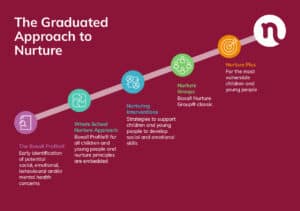
Our graduated approach to nurture ensures that every child in a school has the opportunity to flourish in their education. It ensures that every child has access to the support they need, when they need it. We work to measure and support the social, emotional and mental health of all children using the Boxall Profile®, so no child falls through the cracks.
The Boxall Profile® is an essential part of the graduated nurture approach and sits across all tiers of the nurture pyramid. The Boxall Profile® is crucial to determine what level of support the pupil needs to receive: whether the child will require access to a targeted intervention such as a nurture group, or whether other nurturing interventions such as attending a lunch time group/ afternoon club may be sufficient.
We recommend that all schools and educational settings identify the social, emotional and mental health needs of all their pupils using the Boxall Profile®, to ensure that all needs are recognised and can be supported through early interventions.
To get started or for more information about the Boxall Profile®, please take a look at our website.
An introduction to the Boxall Profile®, the leading tool to assess the SEMH needs of children and young people
The Boxall Profile® is a unique online platform used to assess the social, emotional and mental health (SEMH) of children and young people. The Boxall Profile® enables educators to develop a precise and accurate understanding of individual children’s social and emotional functioning, and to plan effective interventions and support activities to combat barriers to learning.
It is a highly regarded tool that was cited by the Department for Education (Department for Education, 2018, Mental Health and Behaviour in Schools Guidance) and is the most popular measurement used in schools to understand the wellbeing and support needs of their pupils (Department for Education, 2017, Survey: supporting mental health in schools and colleges).
Why is the Boxall Profile® so powerful?
The Boxall Profile® is a powerful tool that can help education professionals to understand what lies behind a pupil’s behaviour, providing an accurate and precise insight into their mental health and wellbeing as well as identifying the level of skills they currently possess to access learning.
This unique assessment tool is powered by over 50 years of rigorous, evidence-based research – tracking and managing children’s social, emotional and mental health needs.
Tiffany Dunworth, a teacher at Laurance Haines School, has described her own experience of using the Boxall Profile® and explains how useful it is in her role:
“This year was my first time doing Boxalls and I found it incredibly insightful. I found that it made me think more deeply about individuals and the results were interesting. For some children, choosing an answer was immediate, for others it took a little bit of thinking time. Conversations after the completion of the Boxalls were helpful and allowed me to understand why children are the way they are and what we can do to support them best. I was initially worried about doing the Boxalls as it was my first time, but I enjoyed the process and found the questions clear and understandable. I feel that I have a better understanding of how to support my pupils with their social and emotional wellbeing.”
Who benefits from the Boxall Profile®?
- Children and young people – the Boxall Profile® gives a voice to children and young people’s behaviours that otherwise go unexplained or often overlooked. It provides an early identification and assessment of needs so children and young people can get the specific support they need at school.
- Practitioners and teaching professionals – the Boxall Profile® increases practitioner’s confidence as they learn the underlying reasons for a pupil’s difficulties and how to overcome them. It offers education professionals a wide range of suggestions about relevant resources and strategies that they can use to support their pupils.
- Schools and educational settings – the Boxall Profile® provides schools with a framework for the systematic assessment of pupils. It also helps them to develop an evidence based, whole-school approach that promotes positive mental health and wellbeing across the school.
- Local authorities and governments – the Boxall Profile® produces quantitative evidence to explore and better plan targeted approaches aimed at supporting social emotional wellbeing. It also helps to measure the impact of mental health support offered to pupils with particular needs, across a whole local authority or whole country.
Why is the Boxall Profile® needed in schools in 2023?
With the effects of the pandemic still taking its toll, many children and young people are concerned about the lasting impact on their education and futures – and these concerns may lead to drastic behaviour changes. According to a recent study by YoungMinds and Beano Brain, the cost of living crisis has also had a negative influence on young people’s mental health as they have become increasingly anxious with concerns about money. It is vital that schools use the Boxall Profile® to identify what may be behind a pupil’s challenging behaviour and what their needs might be.
The need to nurture children and young people’s wellbeing and prevent the escalation of more complex mental health problems has never been more apparent. Schools should monitor the SEMH needs of all pupils and address them at an early stage. The best way to do this is to use the Boxall Profile® – it allows teachers to understand a child’s social and emotional competencies, and to plan effective interventions and support activities where needed.
By understanding and responding to children’s behaviours and the social and emotional pressures they are under using the Boxall Profile®, schools can de-escalate situations which might otherwise lead to exclusion. With the right support and training, many of these issues can be dealt with in a mainstream school setting.
Visit our Boxall Profile® website to learn more about the tool and why it’s important to complete an SEMH Assessment for each of your pupils.


